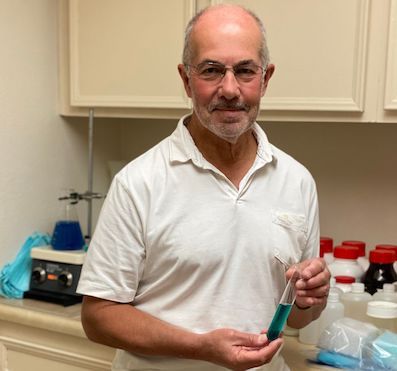 Cleanzine: your weekly cleaning and hygiene industry newsletter 10th July 2025 Issue no. 1170
Cleanzine: your weekly cleaning and hygiene industry newsletter 10th July 2025 Issue no. 1170
Your industry news - first
The original and best - for over 20 years!
We strongly recommend viewing Cleanzine full size in your web browser. Click our masthead above to visit our website version.
Face mask laboratory tests show light-activated dye can destroy human coronaviruses
 Using the natural forces of air and light, scientists have unveiled a potent and versatile new ‘weapon’ in the war against human coronaviruses.
Using the natural forces of air and light, scientists have unveiled a potent and versatile new ‘weapon’ in the war against human coronaviruses.
Exhaustive laboratory tests carried out on face masks treated with a novel chemical agent that produces a potent form of oxygen when activated by light, have shown that it can destroy human coronaviruses closely related to SARS-CoV-2, the coronavirus that causes Covid-19.
Microbiologist Dr David Webber, who has advised the NHS on hospital infection control and was involved with the legislation for the control of Legionnaire's Disease, said it was "probably the most important breakthrough in infection control for almost half a century."
The tests with SingloTex, conducted by scientists at the accredited Perfectus-Biomed laboratories at SciTech science park at Daresbury, Cheshire, showed that almost 99% of the human coronavirus 229E deposited on the masks were inactivated after exposure to light.
"This is a very exciting development with far-reaching potential for infection control by eradicating pathogenic bacteria and viruses on a vast range of both soft and hard surfaces," said Dr Webber, who hails from Ripley in Derbyshire.
"The ability to deactivate human coronavirus on face masks, as proven by the test results, could be extended to all forms of PPE (personal protective equipment) in all clinical and medical settings - including surgical gowns, aprons, gloves and goggles.
"SingloTex is a photocatalytic agent that can be deposited on or integrated into almost any hard surface including plastics, metal, glass and composites and, as such, it has vast potential as an antimicrobial treatment for medical and surgical instruments and appliances, food processing equipment and sanitary ware."
Wearing a face mask has been shown to reduce transmission of Coronavirus by at least 50% but if the mask had been treated with SingloTex this would "produce a further significant level of protection" both for the wearer and others who came into contact with them.
"This is especially critical for all frontline hospital and healthcare workers but also for anyone in any setting who has to wear a face mask or face covering in public," warns Dr Webber.
The patented technology, based on a class of well-documented and scientifically-researched dyes called phthalocyanines, was invented and developed by chemist Barry Noar, a former research scientist at AstraZeneca pharmaceuticals in Cheshire, the company now at the forefront of trials to produce an effective vaccine to prevent Covid-19.
Barry Noar (pictured), who now lives in semi-retirement in California, US, says: "By pure coincidence the first batches of SingloTex went into production at a UK company in Yorkshire around the same time as the world found itself in the grip of the Covid-19 pandemic.
"We have for some time been aware of the potential lifesaving potential of SingloTex, especially on items of PPE, and this has been brought sharply into focus by the pandemic and the global demand for protective equipment. We are greatly encouraged by the fact that laboratory tests showed that it can destroy human coronaviruses in the same family as SARS-CoV-2.
"Unlike conventional surface disinfectant processes using harmful chemicals such as sodium hypochlorite (bleach), ozone and quaternary ammonium components, SingloTex is totally safe and is amazingly potent and effective in destroying harmful viruses and bacteria. Essentially, SingloTex is a novel and highly versatile deposition technology that permits the dye to be deposited onto a range of materials that includes textiles, plastics, paints and almost all hard surfaces.
"The singlet oxygen it produces when triggered by either natural or artificial light, means that, in effect, we are deploying the air we breathe and the light around us to destroy viruses and bacteria. It is satisfying to think that it has such a wide range of uses in so many disparate sectors and, most importantly, can protect lives."
To investigate its antimicrobial potential in a broad spectrum of medical and industrial sectors, a UK company, Singlotech, was set up in June, 2019 and within recent months two licensing agreements have been drawn up with UK companies.
One is with OGM, a large plastic moulding company in Kidlington, Oxfordshire, which is proposing to use SingloTex technology in food packaging and the inks used to print on them, and the other with Churchill PPS of Lichfield, Staffordshire, which has a special interest in the use of SingloTex in military fabrics.
"For the immediate future, we will clearly be preoccupied with the antiviral and antimicrobial applications for SingloTex and especially its potential in the control of coronaviruses, but in the longer term, I am especially keen to see it extended into the field of photodynamic therapy (PDT) in the fight against diseased tissue," says Barry Noar.
"I started my career as a chemist in the pharmaceutical industry developing drugs that would help save people's lives and it would be very gratifying to come full circle and see SingloTex used routinely for patients being treated with PDT,"
SingloTex is being manufactured in the UK by Eye-Dale of Bradford in Yorkshire, an independent chemical consultancy and contract research organisation. Its director David Farrar is the former chief executive and research director of Allied Colloids.
19th November 2020







